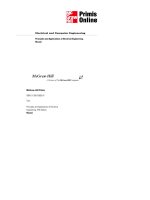Massachusetts Institute of Technology Department of Electrical Engineering and Computer Science
Bạn đang xem bản rút gọn của tài liệu. Xem và tải ngay bản đầy đủ của tài liệu tại đây (145.25 KB, 7 trang )
Massachusetts Institute of Technology
Department of Electrical Engineering and Computer Science
6.087: Practical Programming in C
IAP 2010
Problem Set 3
Control flow. Functions. Variable scope. Static and global variables. I/O: printf and scanf. File
I/O. Character arrays. Error handling. Labels and goto.
Out: Wednesday, January 13, 2010. Due: Friday, January 15, 2010.
Problem 3.1
Code profiling and registers. In this problem, we will use some basic code profiling to examine
the effects of explicitly declaring variables as registers. Consider the fibonacci sequence generating
function fibonacci in prob1.c, which is reproduced at the end of this problem set (and can be
downloaded from Stellar). The main() function handles the code profiling, calling fibonacci()
many times and measuring the average processor time.
(a) First, to get a baseline (without any explicitly declared registers), compile and run prob1.c.
Code profiling is one of the rare cases where using a debugger like gdb is discouraged, because
the debugger’s overhead can impact the execution time. Also, we want to turn off compiler
optimization. Please use the following commands to compile and run the program:
dweller@dwellerpc:~$ gcc -O0 -Wall prob1.c -o prob1.o
dweller@dwellerpc:~$ ./prob1.o
Avg. execution time: 0.000109 msec example output ←
dweller@dwellerpc:~$
How long does a single iteration take to execute (on average)?
(b) Now, modify the fibonacci() function by making the variables a, b, and c register variables.
Recompile and run the code. How long does a single iteration take now, on average? Turn
in a printout of your modified code (the fibonacci() function itself would suffice).
(c) Modify the fibonacci() function one more time by making the variable n also a register
variable. Recompile and run the code once more. How long does a single iteration take with
all four variables as register variables?
(d) Comment on your observed results. What can you conclude about using registers in your
code?
Problem 3.2
We are writing a simple searchable dictionary using modular programming. First, the program
reads a file containing words and their definitions into an easily searchable data structure. Then,
the user can type a word, and the program will search the dictionary, and assuming the word is
found, outputs the definition. The program proceeds until the user chooses to quit.
We split the code into several files: main.c, dict.c, and dict.h. The contents of these files are
described briefly below.
1
main.c: dict.c: dict.h:
#include <stdio.h> #include "dict.h"
/* data structure
#include <stdlib.h>
for the dictionary */
#include "dict.h" /* data structure
char * the dictionary[1000];
for the dictionary */
int main() {
char * the dictionary[1000];
/* declarations */
...
void load dictionary();
}
void load dictionary() {
...
char * lookup(char []);
}
char * lookup(char []) {
...
}
Answer the following questions based on the above program structure.
(a) In implementing this program, you want to access the global variable the dictionary from
main.c, as well as from dict.c. However, due to the header file’s inclusion in both source
documents, the variable gets declared in both places, creating an ambiguity. How would you
resolve this ambiguity?
(b) Now, suppose you want to restrict the dictionary data structure to be accessible only from
functions in dict.c. You remove the declaration from dict.h. Is it still possible to directly
access or modify the variable from main.c, even without the declaration in dict.h? If so,
how would you ensure the data structure variable remains private?
(c) Congratulations! You’re done and ready to compile your code. Write the command line
that you should use to compile this code (using gcc). Let’s call the desired output program
dictionary.o.
Problem 3.3
Both the for loop and the do-while loop can be transformed into a simple while loop. For each
of the following examples, write equivalent code using a while loop instead.
(a)
int f a c t o r i a l ( in t n ) {
int i , r e t = 1 ;
for ( i = 2 ; i <= n ; i ++)
r e t ∗= i ;
return r e t ;
}
(b)
#include <s t d l i b . h>
double r an d d o ub le ( ) {
/∗ g e n e r a t e random number i n [ 0 , 1 ) ∗/
double r e t = ( double ) rand ( ) ;
return r e t / (RAND MAX+1);
}
int s a m p l e g e o m e t r i c r v ( double p ) {
2
double q ;
int n = 0 ;
do
{
q = r a nd do u b le ( ) ;
n++;
} while ( q >= p ) ;
return n ;
}
Note: You only need to modify the sample geometric rv() function.
3
Problem 3.4
’wc’ is a unix utility that display the count of characters, words and lines present in a file. If no
file is specified it reads from the standard input. If more than one file name is specified it displays
the counts for each file along with the filename. In this problem, we will be implementing wc.
One of the ways to build a complex program is to develop it iteratively, solving one problem
at a time and testing it throroughly. For this problem, start with the following shell and then
iteratively add the missing components.
#include <s t d i o . h>
#include <s t d l i b . h>
int main ( in t argc , char
∗ argv [ ] )
{
FILE∗ fp=NULL;
int n f i l e s =
−−a r g c ; /∗ i g n o r e t h e name o f t he program i t s e l f ∗/
int ar g i d x =1; /
∗ i g n o r e t he name o f the program i t s e l f ∗/
char
∗ c u r r f i l e="" ;
char c ;
/∗ count o f words , l i n e s , c h a r a c t e r s ∗/
unsigned long nw=0, nl =0, nc =0;
i f ( n f i l e s ==0)
{
fp=s t d i n ; /∗ stan d ard in p ut ∗/
n f i l e s ++;
}
e l s e /∗ s e t t o f i r s t ∗/
{
c u r r f i l e=argv [ ar g id x ++];
fp=f o pen ( c u r r f i l e , "r" ) ;
}
while ( n f i l e s >0) /∗ f i l e s l e f t >0∗/
{
i f ( fp==NULL)
{
f p r i n t f ( s t d e r r , " Unable to open input \ n" ) ;
e x i t (
−1);
}
nc=nw=n l =0;
while ( ( c=g e t c ( f p ) ) ! =EOF)
{
/∗TODO: FILL HERE
p r o c e s s the f i l e us i ng g e t c ( f p )
∗/
}
p r i n t f ( "% ld % s\n" , nc , c u r r f i l e ) ;
/∗ next f i l e i f e x i s t s ∗/
n f i l e s −−;
i f ( n f i l e s >0)
{
c u r r f i l e=argv [ ar g id x ++];
fp =f o pen ( c u r r f i l e , "r " ) ;
}
}
return 0 ;
}
Hint: In order to count words, count the transitions from non-white space to white space characters.
4
----------------------------
----------------------------
Problem 3.5
In this problem, we will be reading in formatted data and generating a report. One of the
common formats for interchange of formatted data is ’tab delimited’ where each line corresponds
to a single record. The individual fields of the record are separated by tabs. For this problem,
download the file stateoutflow0708.txt from Stellar. This contains the emigration of people
from individual states. The first row of the file contains the column headings. There are eight self
explanatory fields. Your task is to read the file using fscanf and generate a report outlining the
migration of people from Massachusetts to all the other states. Use the field ”Aggr AGI” to report
the numbers. Also, at the end, display a total and verify it is consistent with the one shown below.
An example report should look like the following:
STATE TOTAL
"FLORIDA" 590800
"NEW HAMPSHIRE" 421986
..........
Total 4609483
Make sure that the fields are aligned.
5









